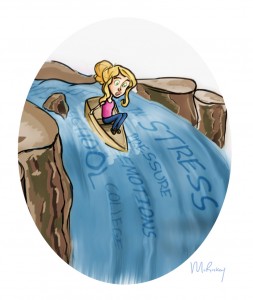Dear Teen and Parent,
For college, of course! Anytime I ask a group of teens if they need money for college, all hands go up. That need may vary but it’s obvious that most teens will need financial assistance whether it is loans, grants or scholarships. A loan will have to be paid back, usually 6 months after college graduation. Grants and scholarships are not paid back, they are both free money! But you have to apply and qualify. I like to keep it simple since there are many ways to find money. If you hear about an organization that will find you money for college but it costs money…don’t do it. They don’t have a secret stash of great scholarships or inside scoop on getting a loan. All the info you need is available to you, you just have to look. If you start with the following three simple steps it will certainly get you going.
1) FAFSA: Everybody needs to do a FAFSA. It’s the Free Application for Federal and State Aid. Without this, you cannot access state and federal loans, scholarships and grants. You may think you have enough money for college, but what if you need a loan? It’s better to do the application and be prepared for any need you may have. The cost of college can vary greatly. The loans through FAFSA usually have a much better interest rate and this is where you can get the subsidized loans if qualified. That means interest is not accruing as you go to school. So when you start your FAFSA (Fall of senior year of high school) be sure to read everything and every step. It’s not a difficult application but it helps to be accurate! It’s available October 1 and due by March 1. www.fafsa.ed.gov
2) Private Scholarships: Do a national scholarship search. Use an established website or program. Your high school may use a certain website or program so it’s best to check there first. There are quite a few databases for private scholarships, but I like fastweb.com. It’s one of the largest databases and you can use a filter to find the scholarships that best match you. You may get a list of hundreds so try to give as much information as possible for the best match. Go through the list and find the ones you feel are the best match for you. If they require an essay, write one! You might be able to use the same or a similar essay for multiple scholarships. And many teens will skip the ones requiring essays so you just might have a better chance!
3) Other Scholarships: By “other” scholarships I mean that your school might sponsor some local scholarships and you will want to check those out. At my school, we keep a list of the local scholarships that many of our kids apply to and get! Another “other” is checking with the colleges you are applying to. Many colleges will sponsor their own scholarships too, with specific deadlines. You can find this information by visiting the college’s financial aid website. Do that for each college you have applied to. Many private scholarship deadlines run throughout the school year. Most are available to high school seniors, but there are a few out there for other grades.
It takes a bit of research and work to find money, but think of it as a part-time job. What if you put ten hours into applying for financial aid and you end up getting a thousand dollars????!!! I think that’s pretty good pay! And you may even get more. The people who try and apply usually are the ones who get some money. Funny how that works. So make a commitment to try. Remember that financial aid can vary depending on your family income and even your grade point average. Some financial aid is need-based and some is academic. Some are both! It certainly won’t hurt to try and you definitely won’t get any assistance if you don’t apply. Be sure to check deadlines since these can also vary greatly. Good luck and happy money hunting!


